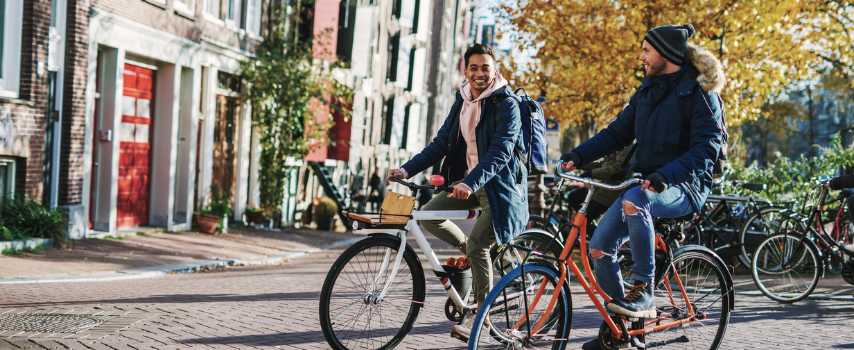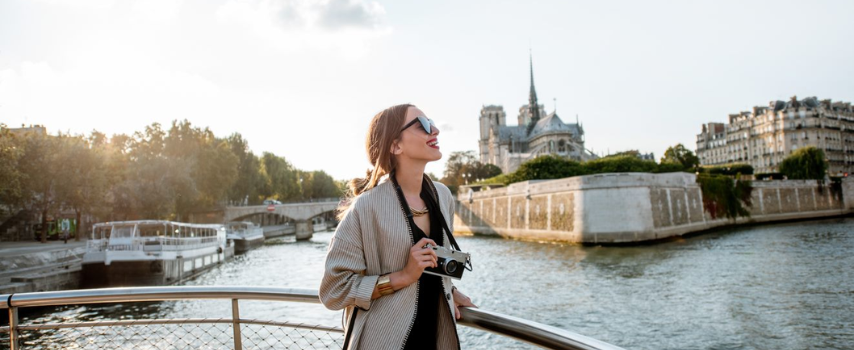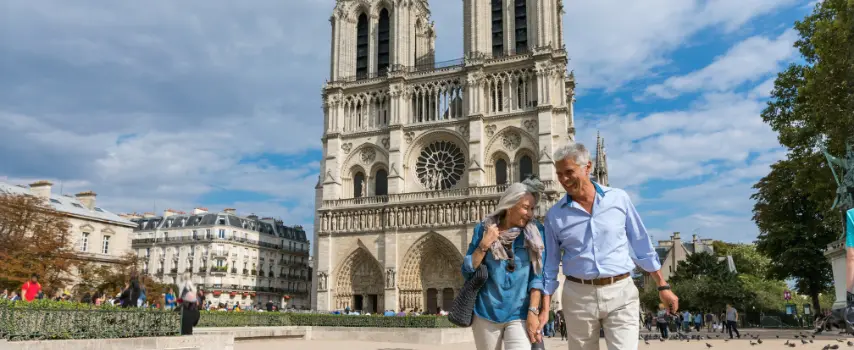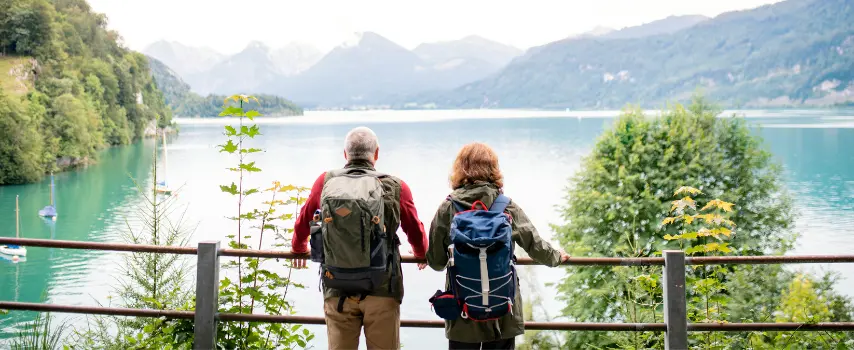How to be an ethical tourist in Europe
Ready to make a positive impact on your European holiday? Learn how to be an ethical tourist with our responsible travel tips for exploring this beautiful continent.

Source: Canva
Discover responsible tourism tips for holidaying in Europe
Do you know what “ethical tourism” is? Also known as sustainable or responsible tourism, it’s making sure you minimise the negative impact on your holiday destination’s environment, local culture and communities, while also promoting a positive experience for both the people who call it home and the travellers who will visit the area in generations to come.
If you’re heading to Europe, it’s important to learn how to be a conscientious and eco-conscious traveller ahead of departing for your holiday. Why? Because every decision we make on the road can significantly affect the people and places we encounter, and we want to make those encounters positive ones.
Fortunately, we can all become responsible, ethical tourists with the right knowledge and a little extra effort.
Here, our easy-to-follow responsible traveller advice covers everything from packing your luggage and planning your journey to transportation and navigation. It’ll help you understand how to make small changes while on the road so you can support responsible tourism and help make a positive impact while exploring our beautiful planet.
14 ways to be a more ethical tourist on your next Euro trip:
- Respect religious, cultural, and historic sites
- Support local businesses
- Pack lightly and reuse items
- Use public transport, cycle or walk when possible
- Respect wildlife and nature
- Be conscious of your carbon footprint
- Give back, responsibly
- Spread positivity
- Practice responsible photography
- Learn basic phrases your destination’s native language
- Respect the local culture
- Conserve energy and resources
- Say no to plastic
- Educate yourself
Source: Getty
Our top tips for being a more ethical tourist in Europe
Tip #1: Respect religious, cultural, and historic sites
If you want to be an ethical tourist when visiting Europe, it’s important to be respectful when at religious, cultural, and historic sites, such as the Sistine Chapel in Vatican City, La Sagrada Familia in Barcelona, the Acropolis of Athens, and the Castle of Prague.
Be sure to familiarise yourself with the proper protocols when entering these places and take the time to learn about their history and significance. Be aware of the local customs and dress codes, too, and always be mindful of locals living there.
Tip #2: Support local businesses
If you want to make a positive impact on your holiday in Europe, it’s important to support businesses run by locals. Make an effort to avoid large global chains and purchase items from local businesses and vendors whenever possible, such as restaurants and cafes owned by locals.
Not only will you be practising ethical tourism by supporting the local economy and helping ensure the survival of small businesses in the area, but you'll also get to taste a slice of local life.
Tip #3: Pack lightly and reuse items
When travelling in Europe, try to pack lightly and reuse items to embrace ethical tourism. Not only can this help reduce your flight carbon footprint, but if you’re catching short-haul flights within Europe, you’ll also save on check-in luggage costs.
If you’ve got space, consider packing reusable items like water bottles or bags rather than purchasing disposable alternatives as you travel. This will help minimise your impact on the environment and will also help reduce the amount of waste that you produce.

Source: Canva
Tip #4: Use public transport, cycle, or walk when possible
Instead of renting a car in Europe, why not use public transport, cycle, or walk whenever possible? Taking a public bus or train can help reduce your carbon footprint and help you be a more responsible traveller, while cycling or walking can also help you explore an area at your own pace and discover hidden treasures you may otherwise miss.
Don’t forget to look for discounts, such as day passes, when using public transport – this may also help you save some cash during your travels.
Tip #5: Respect wildlife and nature
To be an ethical tourist when travelling in Europe, you should aim to respect the wildlife and nature.
Sadly, Europe’s biodiversity is currently declining, with many protected species and habitats experiencing poor conservation status. While European governments are banding together to take action and make better progress on biodiversity, there are little things ethical tourists can do to help save protected species and their habitats.
These actions include:
- Following posted rules and regulations when visiting national parks or nature reserves.
- Making sure you are not disturbing any local wildlife.
- Not leaving behind any rubbish or litter, and disposing of it responsibly in allocated areas.
Tip #6: Be conscious of your carbon footprint
To better practise responsible travel the next time you head to Europe, try to ensure you leave as little environmental trace as possible.
Consider calculating your carbon footprint using an online tool to better understand the impact of your trip, as well as choose to offset your flight's carbon emissions. You could also choose eco-friendly accommodations to minimise your environmental impact.

Source: Getty
Tip #7: Give back, responsibly
If you’re looking for a way to be a more ethical tourist while travelling in Europe, one impactful approach is to volunteer with a local organisation or charity. This could be an effective way to positively impact the places and people you encounter during your travels, while giving you hands-on experience that can deepen your connection and understanding of the destination.
Just remember: If you're interested in volunteering, be sure to research ethical organisations that genuinely benefit the community and environment before you commit.
Tip #8: Spread positivity
Sometimes, it’s the little things that make the most impact. Being mindful of your words and actions by treating locals and fellow travellers with respect and kindness is something we can all do to normalise responsible tourism.
Plus, this doesn’t have to end once your trip ends – you can keep spreading positivity by sharing your amazing European experiences on social media and also recommending responsible businesses to fellow travellers.
Tip #9: Practice responsible photography
Do you have a bucket list of photos you want to snap during your Euro trip? Maybe you’ve got your heart set on a well-framed shot of Brunelleschi’s Duomo in Florence, a selfie with the beautiful blue church domes in Santorini, or even some street photography featuring the well-dressed residents of Paris.
No matter what snaps are on your list, keep in mind it’s best to ask for permission before taking photos of people or sacred sites when travelling in Europe.
Also, be mindful of your surroundings and avoid intrusive or disrespectful photography if you’re trying your best to travel as an ethical tourist. In Europe, this means it’s best to take pictures of the people and places in a way that celebrates their culture rather than exploiting it.

Source: Getty
Tip #10: Learn basic phrases in your destination’s native language
Showing respect for the native culture and people by making an effort to learn their language will get you far when travelling through Europe. If learning lots of phrases isn’t possible, try greeting locals with “hello” and using “please” and “thank you” in the native language to show you care and respect them.
For example:
- If you’re going to France, “Hello” is "Bonjour”, "Please" is “S’il vous plait”, and “Thank you” is “Merci” in French.
- If you’re going to Greece, “Hello” is “Yassou”, "Please" is "Parakalo" and “Thank you” is “Efcharisto” in Greek.
- If you’re going to Spain, “Hello” is “Hola”, "Please" is “Por favor”, and "Thank you" is “Gracias” in Spanish.
- If you’re going to Germany, “Hello” is “Hallo”, "Please" is “Bitte”, and "Thank you" is “Danke” in German.
- If you’re going to Italy, “Hello” is Ciao, "Please" is “Per favore”, and "Thank you" is "Grazie" in Italian.
Tip #11: Respect the local culture
When visiting any new place, respecting its local culture is important if you’re serious about ethical tourism.
Remember to research any customs, religions, and laws before you arrive to avoid making any cultural mistakes or offending the locals.
Also, make an effort to dress appropriately in religious or sacred sites (such as St Mark’s Basilica in Venice and Stonehenge in England), and be respectful of people’s customs during your travels (such as ensuring your shoulders, chest and knees covered when visiting Roman.
Catholic churches in Rome, and making a donation when accepting a candle to light in Greek Orthodox churches in Greece).
Tip #12: Conserve energy and resources
In Europe, increasing energy efficiency, reducing consumption and conserving resources are a top priority, and European governments are working to meet their goal of climate neutrality by 2050.
So, when travelling through Europe, it’s best to engage in responsible travel practices to help play your part in Europe’s climate goals.
Here are some easy ways you can do this during your Euro trip:
- Turn off lights, air conditioning and other appliances if you are not using them.
- Don’t leave the tap running while brushing your teeth or washing your hands.
- Take short showers instead of baths and look for hotels with programs to reduce water waste.
Tip #13: Say no to plastic
Plastic pollution is one of Europe’s biggest environmental problems. That’s why the European Union adopted the plastics strategy in 2018, and many European nations have banned single-use plastics completely.
To leave as little negative impact as possible and be a truly ethical tourist while in Europe, say no to single-use plastics as much as possible during your trip.
Instead, bring your own reusable water bottle and containers for food, and avoid plastic straws, cutlery and other disposable items whenever possible.
You can also reduce your waste by taking advantage of the local composting or recycling programs.
Tip #14: Educate yourself
Travel should be all about new experiences and learning new things. The good news is this: By making an effort to educate yourself on the history and culture of the places you’re visiting in Europe, you’ll be expanding your horizons as well as practicing responsible tourist.
No matter where your European adventure takes you, seek out educational experiences such as local walking tours or workshops at your chosen destinations that can teach you more about the area and its people.

Source: Getty
With these responsible travel tips, we can all be more responsible travellers in Europe. Not only can making thoughtful decisions before and during your trip help you have a positive impact on the people, places, and environment you encounter, but it can also help you create more positive holiday memories.
Don’t forget: Every little action counts in making a positive change for our planet, so go ahead and explore, responsibly.
Don’t forget to consider travel insurance for Europe
No matter where your travels take you, it’s important to consider travel insurance. At Cover-More, we provide international travel insurance cover suitable for holidays to Europe.
We offer three international plan options, all with access to 24/7 emergency assistance to help ensure you can get the help you need when you need it.
Plus, we’re committed to sustainably and caring for our community. We proudly support the Z Zurich Foundation, where we give back to communities around the world and help create a brighter future for vulnerable people.
Travel Insurance for Europe Holidays
Travel safely and responsibly with Cover-More by your side – get an online quote today.
